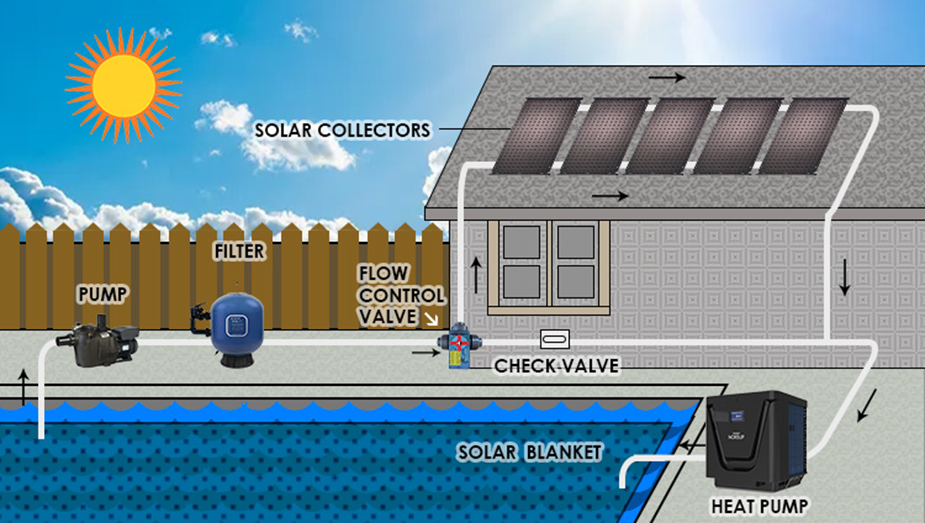Solar-assisted heat pumps, also known as solar-integrated heat pumps or solar heat pumps—a cutting-edge technology merging solar panels with heat pump efficiency. Often referred to as solar thermal heat pumps, these systems represent an exceptionally effective solution for generating hot water in your home.
Working
In the hybrid system of solar panels and a heat pump for
pool heating, the process begins with the pool pump drawing water. This water
is directed to a flow control valve, which decides whether it goes directly to
the heat pump or through solar panels first.
A solar pool heater operates by harnessing the sun's energy
to warm your swimming pool water. This system involves solar panels, often
mounted on your roof or in a sun-exposed area. These panels consist of tubes or
channels. When sunlight falls on the solar panels, a special material inside
them absorbs the sun's energy. This absorbed energy is then transferred to the
water circulating through the tubes. As the pool water passes through the solar
panels, it absorbs the solar energy, resulting in its temperature increase.
The water is then passed through a heat pump. The heat pump
absorbs heat from its surroundings and uses it to heat the water instead of
producing heat directly. The now-warmed water is then directed back into your
pool, effectively raising the overall pool temperature.
To prevent evaporation, we highly recommend the use of solar pool blankets. They are also an excellent option in facilitating passive solar heat gain, and heat retention.

Efficiency Benefits
The solar-heat pump hybrid pool heating system maximizes
efficiency by seamlessly integrating two powerful technologies. Solar panels use
sunlight to heat the pool water. This direct conversion of solar energy into
thermal energy minimizes reliance on traditional energy sources, making the
system highly energy efficient. In regions with ample sunlight, the solar
panels become particularly effective, enhancing the overall efficiency of the
system.
Simultaneously, the heat pump component complements this
efficiency by extracting heat from the ambient air. This dual-technology
approach ensures continuous heating even when solar efficiency is reduced, such
as during cloudy days or nighttime.
Compared to conventional pool heating methods, the hybrid
system's efficiency shines through. It reduces the need for constant reliance
on electric or gas heaters, lowering energy consumption and minimizing
environmental impact. This is especially evident in areas where traditional
heating methods may struggle, showcasing the adaptability and effectiveness of
the hybrid approach.
Reliability Benefits
The reliability of a hybrid solar-heat pump pool heating
system is rooted in its versatile and dual-technology design. This system
ensures consistent performance under diverse conditions, addressing the
inherent limitations of individual heating methods.
During periods of ample sunlight, the solar panels
efficiently harness solar energy to heat the pool water directly. This reliance
on a renewable and abundant energy source reduces dependence on external power
and enhances the system's resilience, especially in regions with consistent
sunlight.
In instances where solar efficiency is diminished, such as
on cloudy days or at night, the heat pump seamlessly takes over and maintains a
continuous pool heating process, ensuring users can enjoy a warm pool
experience regardless of whether variations.
Unlike single-mode heating systems that may struggle in
adverse conditions, the combination of solar and heat pump technologies ensures
adaptability and reliability.
Cost Benefits
The cost benefits of a solar-heat pump hybrid system extend
beyond just financial savings. By harnessing solar energy and minimizing
dependence on conventional electricity, homeowners experience a noticeable
reduction in utility bills. The solar panels, operating on sunlight, contribute
to substantial energy savings, making the system an economically viable choice
over time. While the initial installation cost may be slightly higher than
traditional pool heaters, the long-term energy savings and reduced maintenance
costs make the solar-heat pump hybrid an economically sound investment.
Additionally, the extended lifespan of hybrid systems, thanks to their
dual-heating methods, translates to fewer repair and replacement expenses over
the system's life.
Environmental Benefits
The combination of a solar pool heater and a heat pump
brings about significant environmental benefits. Unlike traditional heating
systems that rely on non-renewable energy sources, this hybrid system leverages
solar panels to harness the sun's clean and abundant energy directly. By
tapping into renewable resources, it reduces the overall dependence on fossil
fuels, leading to a substantial decrease in the carbon footprint associated
with pool heating.
Moreover, the integration of a heat pump further enhances
the environmental advantages. The efficient extraction of heat from the ambient
air by the heat pump minimizes the need for conventional electricity or gas
heaters, which often contribute to greenhouse gas emissions. This
dual-technology approach results in lower emissions, aligning with the global
imperative to combat climate change and reduce the impact on the environment.
In addition to mitigating emissions, the solar-heat pump
hybrid system contributes to the conservation of natural resources. By
harnessing solar energy and extracting heat from the air, it lessens the strain
on finite resources, promoting a sustainable energy model. This
conservation-focused approach is a crucial step towards responsible energy
consumption, ensuring that future generations can inherit a planet where
resources are used judiciously.
The combination of solar panels and a heat pump not only maximizes
efficiency, reliability, and cost savings but also promotes environmental
responsibility. By harnessing the sun's abundant energy and extracting heat
from the air, this hybrid system not only ensures a warm and inviting pool but
also contributes to a sustainable future. The reduced reliance on traditional
energy sources and the minimized carbon footprint makes this solar-heat pump
pairing a compelling choice for those seeking a balance between comfort and
environmental consciousness.
No comments yet. Start a new discussion.